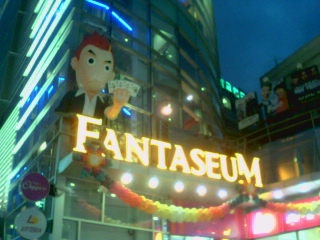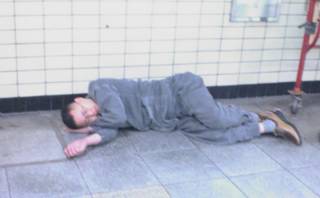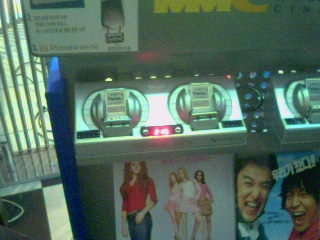Just so you know, this blog isn't about being political. If anything, it's about as apolitical as you can get for blogging. However, there is something that I wanted to comment on: you can use it to form your views or not. Oh, and I talk about some of the important points in here, so if you're going to see the movie bookmark this and read it later.
Last night I saw
Fahrenheit 9/11 (click for a
local review and a trip to the
warroom). It was a pretty good film. I had seen a few clips from it so I had an idea of what to expect, which was kind of unfortunate. Some said "you'll laugh, you'll cry" and I think knowing that dampened the mood a bit. It may have been better if I didn't know what to expect (and, sorry, now you know kind of what to expect so I opened a bit of Pandora's Box for you too).
When getting the required popcorn and drinks (5,000 won, 4.50USD for a large tub and 2 drinks!) I was greeted by this guy (below). I had to say, "That's quite a get-up you got there", knowing/hoping he wouldn't understand. At the door to the actual theatre a guy and a gal in the same costume did a little salute as everyone filed in. I didn't think about them again until the end of the movie.
 Soon he'll be wearing a different uniform.
Soon he'll be wearing a different uniform.
Fahrenheit 9/11 was a pretty interesting show. It tweaked a few memories I had from that day. When it happened I was in bed in Vancouver, just waking up. As a stockbroker I was wired to the daily news and had turned on my T.V. at 5:50AM. The news of the first plane was already broken and I was thinking, "What the heck? Some moron pilot slammed into one of the largest buildings in the world? Was it a terrorist?" When the second one hit I think we all knew that it was no accident.
I watched it all that morning. Waiting for the fires to be brought under control; or maybe for another plane to hit another tower. Who could tell what might happen? It was especially surreal for guys like me, I think (egotistical, eh?). My dream, as any guy in finance would have, was to be to be in Windows on the World (the posh restaurant at the top of one of the towers) giving a high-powered presentation to the money-men of New York and the world. That dream seemed more like a death sentence now. I don't know what the emotion was, but you might say I was relieved that I didn't go to Wharton or have a CEO dad who might get me into that room on that day. Of course you didn't have to be a financier to be there, many blue-collar people (firefighters and police) and 'regular Joes and Janes' were there as well.
The next day I went to work. It was quite odd. There was little to do and there was an eerie quiet as the sounds of the harbor-planes were absent. All I could think about was the day before. I still wonder why the heck they showed the towers getting hit and then crashing to Earth so many times in the weeks following. It sure didn't help my spirits.
Back to the movie. I knew what Michael Moore was up to when he made this film. His previous works included: Roger & Me (where he went looking for the CEO of GM (Roger Smith) for answers why his hometown of Flint, Michigan was laid waste by layoffs by the firm) and Bowling for Columbine (where he looked into the psychology of guns and violence that may have lead to the Columbine shootings). I saw a show or something with him as he went all over the country promoting his newest book and noting that the employees of the bookstores were basically getting shafted by their employers (part-timers with no benefits, low salaries, fired for small errors...hmmm sounds like Korea in some ways!). Now, I'm in finance, mostly of the idea that business is good, so even though I found the anecdotes he collected to be interesting and in some cases a little unsettling it didn't really change my thinking much. (I think most of us are pretty set in our ways unless we get overwhelming evidence over a long period of time.) I knew that Moore would be going after Bush, but I had no idea how much he had on him (or at least how bad he could make him look).
Moore's 9/11 was, as a documentary should be, presented as a well-researched, factual and intellectual piece. It went into the histories of the major participants (although not much on Saddam and I was worried about how he said that Iraq never hurt an American: some of it smelled of hyperbole) and presented the facts in logical sequence. Then he threw in a curveball. He had a gal in there (a wife and mother) who, in the beginning, loved the U.S. and the armed forces a lot. She carried her American flag out each day to hang on the front of her house--careful NEVER to let it touch the ground. Later, after her son died, she hated what had happened in her country. I'll tell you the worst part was how she was given the news--it was OVER THE PHONE! I remember in
We Were Soldiers the Army sent the notices to the next of kin by taxicab (delivered by the drivers, no less) as there were so many dead they did not have enough officers to do the job. That, I thought was a low point, but this story plumbed the depths.
Clearly, Moore was not trying merely to make President Bush look bad (he made virtually everyone--Cheney, Rumsfeld, Rice--look unprofessional, but he could have done that to any of us who have been in front of the camera). He could have easily made the soldiers in Iraq look like unfeeling grunts bent on discharging their weapons at anything and anyone (which, it seems, they did do at times, but that was chalked up to the adrenaline rush of being in a hot zone). No, he went at things on a bit of a different tact. He personified not only the soldiers, but something more identifiable not only for Americans but for anyone who had a loved one in any country's armed services--he made a poster child of those who are left behind (temporarily or permanently) when a service member heads off on assignment in this mother who lost her son.
The mother (pictured below) is the real story and storyteller here. President Bush is a major figure, Moore is the one who brought it all together, but its her story that hits home more than any other. No 9/11 inquiry or senate committee can take away from her and her family's loss. Her husband said it best, though, when he said, "We are very sad to lose our son in the war, but we are more sad to know that families all over America are having the same thing happen to them right now." (I'm paraphrasing from my fallible memory, but I think you get the point.) It's the families that suffer(ed) when 800+ troops were killed in Iraq. (We also can't forget the loss of those in WTC, a disaster that was foreshadowed specifically in Presidential Briefings.) For some their will to support the President and perhaps America itself may have been broken. I thought of our popcorn-seller (above) and how his family would react if he were shipped of to war, trading one uniform for another. What if my son(s) were sent off without an imminent threat, as we had in WWII and other 'respected' wars? How could you be proud of a country that did that to its children?
 Who is the main character in Fahrenheit 9/11? President George W. Bush? Michael Moore? or the mother of a fallen soldier?
Who is the main character in Fahrenheit 9/11? President George W. Bush? Michael Moore? or the mother of a fallen soldier?
So, what is next? Will there be a sequel in a few years? Perhaps Fahrenheit 38 Degrees? (Meaning the parallel of latitude that splits North and South Korea, and translated to Celsius that's just 3.3 degrees--close to freezing, kind of a cold war, which is what we have here: a war, but no open hostilities.) I doubt, after all this, that Bush (or any U.S. President for the next while) has the political muscle to go after North Korea, and that's just fine by me. Heck, if anything happens Seoul is within range of the North's artillery (!), to say nothing of any missiles they may have that could get airborne (and if the U.S. says they don't have the capabilities I'm inclined now to think that maybe they do).
Some things are different in Korea. For one, the two Koreas are still, technically, at war. Only an armistice (or cessation of open combat) was signed, not a peace treaty. I read the North signed it but the U.S. declined to sign it--hearkening to Moore's idea that the military-industrial-political complex needs a 'constant state of high alert and confusion' to reach its aims (which are, mainly, focused on money).
I'm going to digress for a little bit here, sorry. Much of what we know as culture can be traced back to war. For instance, the Rhodes Scholarship to Oxford that former President Bill Clinton received was founded by
Cecil Rhodes: one of the wealthiest and most powerful men of his time (so much so that the country of Zimbabwe's former name is Rhodesia, named after him). He made him money from exploitation of South African diamond mines--a country which was finally conquered by the Boer Dutch in 1902, the same year Rhodes died. As well, the respected
Nobel Prize was founded by Alfred Nobel who made his money from a little product he invented: dynamite/T.N.T. A technological triumph that is best known as 'the thing that makes things blow up', as an explosives expert might put it.
Back to Korea. Here there is really no question of whether the leaders are looking out for the people or themselves. A
recent article reported that 74% of respondent to a survey of Koreans said they believe politicians are law-breakers. Maybe the same is true in the U.S., but 74% pretty much tells you that people here don't need a Michael Moore documentary to know what goes on behind closed doors. (I'm not sure if that is a good thing.)
The difference here, though, is the threat. As I said, there is still a war going on. South Korea has a mandatory term of military service for all male citizens with an
18-month jail sentence for those who do not comply (of course with a criminal record comes no chance of a job with the government or any larger company, so it's actually more of a life sentence). In the U.S. service is voluntary, it may be seem coerced given the salespitch of the recruiting officers, but it is, in the end, voluntary. Those who are in the service and do not want to be (re-)deployed to a place like Iraq are subject to court martial and possible imprisonment. Again, the difference here is North Korea has been saying for over 50 years that they are the real rulers of the Koreas and they will take back the South; while Iraq did not make (according to Moore, I'm not sure about this point) threats toward the U.S. North Korea also does not have any resources (something that can't make the economy in that non-trading country very viable).
Anyways, this is a record blog length for me, and I'm glad you came along for the ride. My last word is simply that after Moore's 9/11 movie I think many people, myself included, will start to ask more questions and make creating such wars (if I may go so far as that) harder to do in the future...and that, I imagine, was its intent.


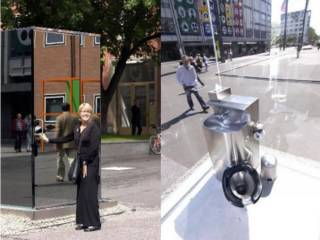

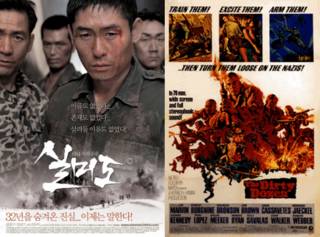
.jpg)
.jpg)
















.jpg)

